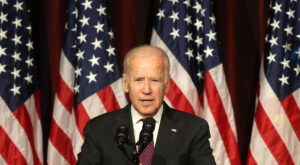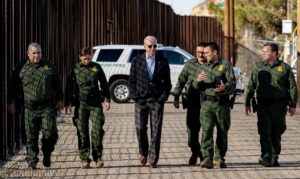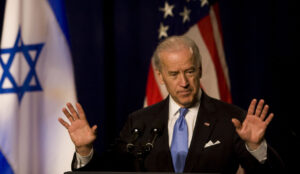Over the past decade, Republican hawks have looked on in horror as their party drifted away from the interventionist foreign policy of the Cold War years and the War on Terror. Last Friday, in a conference hall tucked inside the Sheraton Hotel in Nashua, New Hampshire, their political operatives attempted to steer the ship back.
About 80 local voters crowded into the room for the latest leg of the “America the Great Tour”, which hopes to elevate national security issues during the Republican presidential race. The forum was held in concert with an official event hosted by the New Hampshire GOP, kicking off the final months before voting gets under way.
Speaking on the panel, Doug Burgum, the billionaire governor of North Dakota and a long-shot Republican presidential candidate, explained that the escalating war in Israel is in fact “a proxy war against America”. “If you’re running for President of the United States of America, you better understand whose side you’re on,” he continued, in a veiled swipe at those cautioning against a broader conflict. The crowd roared.
Sitting next to him was Senator Joni Ernst of Iowa, who had warmed up the crowd by emphasising America’s need to improve its military readiness. She warned that Russia’s invasion of Ukraine and the withdrawal from Afghanistan were failures of leadership. Such decisions, she said, showed that the Biden administration “seems to fold like a cheap card table every time the pressure is put on”.
The host of the event, Morgan Ortagus, a polished former State Department official, was no less forthright. As she opened the event, she reminded the audience of her plans to hold the forum that day in Israel, until Hamas launched its terror attack. Even this, she claimed, was a reminder of the importance of the panel’s mission: “When Hamas and Hezbollah and Iran chant death to Israel, they also chant death to America. Make no mistake: this was an attack on not only the state of Israel but also on the United States of America”.
Sponsored by Polaris National Security and the Bastion Institute — two stars in a constellation of organisations designed to revive the hawkish tradition within the GOP — Friday’s event was part of a conscious plan to push back against Donald Trump’s “America First” repositioning of the party. During his run for office, Trump openly mocked the Iraq War as “a big mistake” and criticised the use of US money on its allies in Europe and the East Pacific as unfair to American taxpayers. In recent months, he has promised a quick end to the Ukraine war, suggesting he can hammer out a peace treaty with Vladimir Putin “and have the deal done in one day”.
Such rhetoric has clearly struck a chord with Republican voters, 60% of whom now say they favour decreasing US military support for Ukraine. In Washington, meanwhile, Congressman Matt Gaetz of Florida, one of the most insurgent pro-Trump voices in the party, recently succeeded in toppling the Speaker of the House in part by rallying opposition to new funding for the war in Ukraine. On the party’s fringes, Vivek Ramaswamy, the upstart presidential candidate, has made opposition to “forever wars” a main plank of his campaign.
Faced with such opposition to their neoconservative worldview, how have the GOP’s most prominent interventionists responded? Some, such as Bill Kristol, have decided to leave the party. But many are fighting back.
In 2021, Elliott Abrams, who led the 1998 “Project for the New American Century” (PNAC) letter demanding the removal of Saddam Hussein as a primary policy goal, founded a new group called the Vandenberg Coalition, named after the Michigan Senator Arthur Vandenberg, who helped build the foundations for Nato in the post-war era. “The Republican Party,” wrote Abrams on its launch, “needs to adopt a forward-looking foreign policy for today’s unprecedented security environment.” The coalition involves Randy Scheunemann, the former head of the “Committee for the Liberation of Iraq”, Doug Feith, a former Defense Department planner for the Iraq War, and Lewis “Scooter” Libby, the former chief of staff to Vice President Dick Cheney.
Yet perhaps the most interesting expert in the Vandenberg Coalition roster is Ortagus, a failed former congressional candidate who previously worked with several think tanks focused on national security and, for a period, as a spokesperson at the State Department. Ortagus is a regular conservative media pundit and, it seems, a growing force in the Republican Party.
A self-described “evangelist for national security issues”, Ortagus sits at the nexus of several of the new hawk advocacy groups: she is, for instance, the founder of Polaris National Security and is on the board of the Bastion Institute. As part of these roles, she has spent the past year travelling across early presidential primary states — Iowa and New Hampshire — organising events such as the panel in Nashua to showcase the party’s commitment to a confrontational foreign policy. Though the forums are technically run through a non-profit research institute, they have the air of a campaign-style rally, with jumbo American flags and raised platforms carrying rows of camera equipment.
What is it hoped they will broadcast? “The focus is to go around the country and talk about national security policy, and talk to the average American about why that matters,” Ortagus told me at the Nashua forum. And who backs the group? Where is it getting its money? “Oh, that’s not disclosed,” she said with a smile.
So far, most of the events have focused on promoting the message of leading hawks in the party, Mike Pence and Nikki Haley, with a particular prominence given to America’s adversaries, including China and Russia. Ortagus, at the panels, has sought to reframe immigration as a national security priority, with warnings that foreign terrorists are slipping over the southern border.
Over the past fortnight, however, this emphasis has shifted. Since Hamas’s attack, the focus has almost entirely been on supporting Israel’s military campaign in Gaza, along with the need to extend the war to Iran, which is one of the primary financial sponsors of Hamas. This is despite the fact that, earlier this week, Biden made clear that there is “no clear evidence” that Iran had any involvement in Hamas’s assault on October 7 — a claim the Iranian government is also at pains to point out.
And yet, despite this lack of evidence, the neoconservative wing of the Republican Party continues to mobilise for a new war. Senator Lindsey Graham, a leading hawk, said he did not need evidence of Iran’s involvement in the Hamas attack to launch a pre-emptive strike. “What I would do is bomb Iran’s oil infrastructure,” he told CNN last week. Elsewhere, Elliott Abrams of the Vandenberg Coalition has said that the US should “contemplate some kind of military reaction” against Iran. “There are plenty of Iranian targets,” he added.
Other members of the new hawk advocacy groups have been similarly vocal. Earlier this week, Ortagus presented the Hamas-Israel war as an American-Iranian conflict, pointing out on Fox News that Americans were killed during the attack and some were taken as hostages. “Take Israel out of this,” she said. “What is the American response to this? How are we avenging our people that are killed? It is time to stand up to the Islamic Republic of Iran. They are not ten feet tall and we can take them on.”
Will such inflammatory rhetoric inspire action? It can’t be ruled out. When, in the late Nineties, the PNAC demanded that Clinton wage war on Iraq to remove its president, many dismissed it as far-fetched. But only a few years later, 9/11 rapidly reshaped the political calculus, as the neoconservative movement swept in to galvanise a traumatised nation into new conflicts abroad. The lack of strong intelligence around weapons of mass destruction mattered little in a time of retribution and fear.
Today, the shock and horror of Hamas’s assault has been rightfully called Israel’s 9/11. President Biden has wasted no time in pledging US support for Israel’s forces and travelled to Tel Aviv yesterday to make his commitment clear. But, just as in 2001, the neoconservatives are waiting in the wings, pushing to transform this crisis into a regional war — and dragging America into another Middle Eastern intervention.
Disclaimer
Some of the posts we share are controversial and we do not necessarily agree with them in the whole extend. Sometimes we agree with the content or part of it but we do not agree with the narration or language. Nevertheless we find them somehow interesting, valuable and/or informative or we share them, because we strongly believe in freedom of speech, free press and journalism. We strongly encourage you to have a critical approach to all the content, do your own research and analysis to build your own opinion.
We would be glad to have your feedback.
Source: UnHerd Read the original article here: https://unherd.com/




